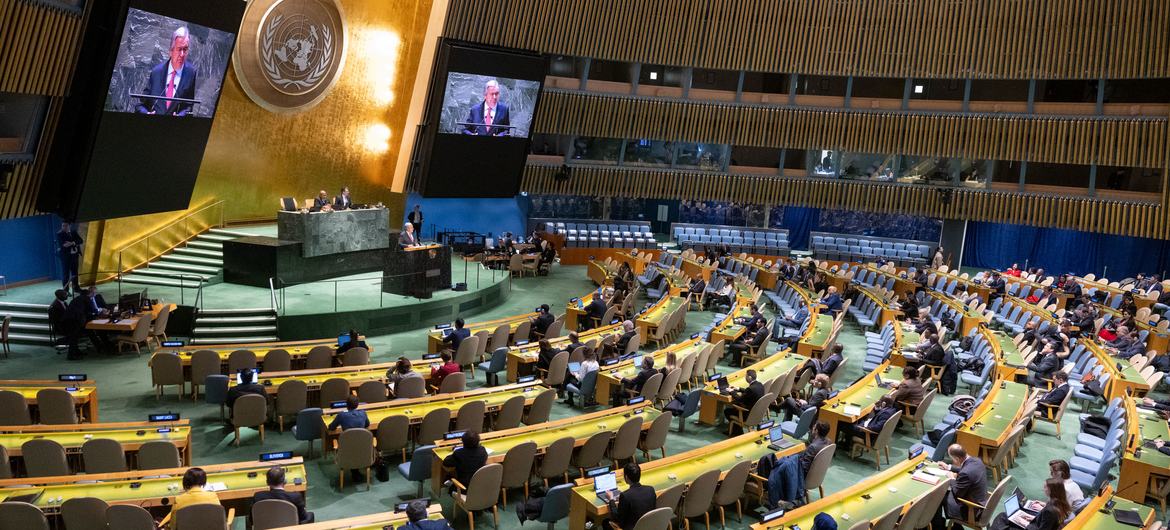United Nations General Assembly: Italy’s Voting Behaviour on Human Rights Resolutions during the 78th Session

The General Assembly (GA), which is the main deliberative body of the United Nations, is composed of six Committees, each of which is made up of all 193 United Nations Member States. Human rights issues are handled mainly within the Third Committee (the Social, Humanitarian and Cultural Committee). The responsibilities of this Committee include issues such as torture and other cruel, inhuman and degrading treatment or punishment; the advancement of women; the rights of refugees and displaced persons; the promotion and protection of the rights of children; the rights of indigenous peoples; the elimination of racism, racial discrimination, xenophobia and related intolerance; the right of peoples to self-determination; and social development.
The 78th session of the GA adopted 335 resolutions, from which 87 resolutions were adopted with a vote and 250 without a vote. The resolutions adopted during the 78th session concerned a wide range of issues, from the Disarmament (Nuclear and General), Sustainable Development, Peace and Security, to Self-Determination and Decolonization.
In 2023 and 2024, Italy’s Permanent Representative to the United Nations in New York was Ambassador Maurizio Massari. He delivered statements on various occasions, including addressing the General Assembly's plenary meetings and participating in discussions on topics such as humanitarian aid in Gaza and the protection of persons in the event of disaster.
During the 78th session of the United Nations General Assembly, Italy played an active role in various initiatives and discussions, demonstrating its commitment to multilateralism and addressing global challenges. Italy strongly supported UN Security Council reform, advocating for a more representative and effective body with fairer geographical distribution and regional representation. Additionally, the country co-hosted a high-level side event focused on education, emphasizing its importance as a catalyst for achieving the Sustainable Development Goals (SDGs). Italy also made a notable pledge of 2 million Euros to the Food Window of the Joint SDG Fund, addressing the critical intersection of food security, climate action, and displacement. Prime Minister Giorgia Meloni reaffirmed Italy's unwavering support for multilateralism, stressing the role of the UN in responding to global crises and advocating for reforms that promote equality and democracy. On migration and regional cooperation, Italy, represented by Deputy Prime Minister Antonio Tajani, engaged in discussions about migration issues, particularly with Africa and the Western Balkans, and chaired a meeting focused on UN Security Council reform. Through these efforts, Italy reinforced its position as a key player in shaping international policies and fostering global collaboration during the 78th UNGA. In 2007 Italy proposed the first General Assembly resolution calling for a global moratorium on the application of the death penalty. The resolution, adopted every two years, was approved in 2024 with 130 votes in favour, the highest number ever obtained since 2007.
Specifically Italy presented the Resolution on the Situation of human rights in the temporarily occupied territories of Ukraine.
Furthermore, Italy sponsored 77 resolutions and was asked to pass an open vote on 87 resolutions (52 in favour, 21 against, 14 abstentions) the outcome of which is shown below.
Italy showed a generally supportive stance toward the majority of UN General Assembly resolutions, especially those aligned with Western democratic values and multilateral cooperation. However, it also voted against or abstained on a notable number of resolutions, mostly those led by countries like Cuba, China, and Russia. This indicates clear political or human rights-related disagreements with the framing or content of those proposals.
This voting pattern reflects Italy's alignment with EU and NATO partners, especially in matters involving human rights, disarmament, and international cooperation.
The attached table provides an overview of the human rights’ resolutions adopted by the United Nations General Assembly in its 78th session.

